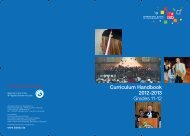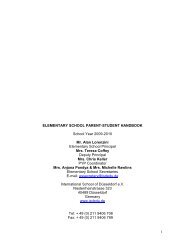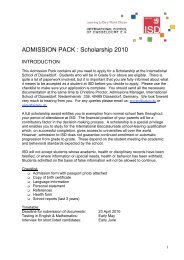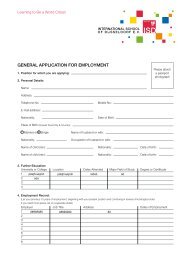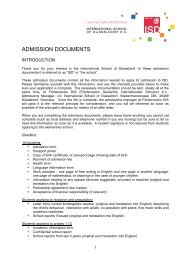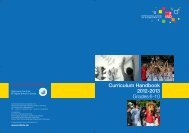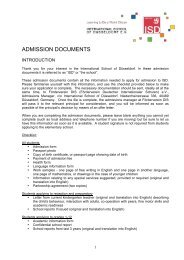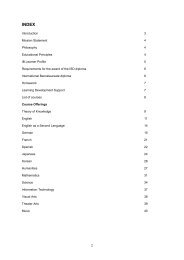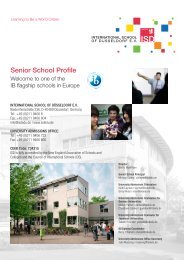SENIOR SCHOOL STUDENT - PARENT HANDBOOK
SENIOR SCHOOL STUDENT - PARENT HANDBOOK
SENIOR SCHOOL STUDENT - PARENT HANDBOOK
You also want an ePaper? Increase the reach of your titles
YUMPU automatically turns print PDFs into web optimized ePapers that Google loves.
Timescale for expatriate candidates:<br />
1. Applications are considered and students may start throughout the year,<br />
2. Testing and decisions for G 6-8 throughout the year.<br />
3. Testing for G 9-12 early August. Decisions throughout the year. Final<br />
placement depends on test results.<br />
Timescale for host country candidates:<br />
1. The deadline for receipt of completed admission paperwork for local<br />
students in all age groups is 30 April. Start date mid August.<br />
2. Testing and decisions for G 6-8 throughout the year.<br />
3. Testing for G 9-12 throughout the year, or early August. Decisions<br />
throughout the year. Final placement depends on test results.<br />
3. Age placement. New students will normally be placed in their age-appropriate<br />
group based on a cut-off date of 1 September.<br />
Senior School applicants should note that academic history is generally more<br />
useful than the student’s age as a guide to placement. An ISD diploma requires<br />
four full years of education between G 9 and 12. ISD does not normally accept<br />
students who will reach their 21 st birthday before the date of their graduation.<br />
On rare occasions it may be advisable for a student to “skip” or repeat a grade.<br />
Such requests or recommendations can be made by the parents or the school,<br />
but the principal – or the director on appeal – makes the final decision about<br />
student placements.<br />
4. English as an Additional Language (EAL). Students for whom English is not<br />
the first language will normally be tested to establish their EAL requirements<br />
within the context of ISD. Students with no previous knowledge of English will<br />
not be admitted into G 10 and above.<br />
5. Learning support. The school is able to offer some learning support to a limited<br />
number of students with mild special educational needs. Students must be able<br />
to function independently in a normal classroom environment. The school<br />
reserves the right to refuse admission to any student deemed unlikely to benefit<br />
from the existing program, or if the school’s learning support resources are<br />
already fully used by existing students.<br />
Students experiencing problems at school in their own native language and who<br />
have limited English will not normally be admitted.<br />
While there are no special programs for children regarded as gifted, the small<br />
class sizes and quality of instruction enable such children to be challenged<br />
appropriately within the existing program.<br />
11



